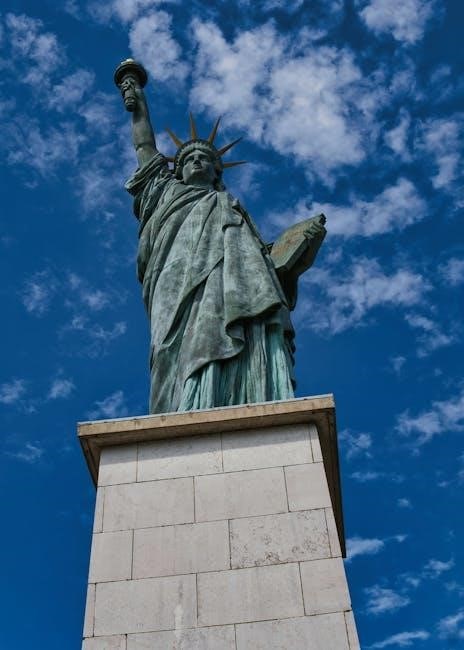
history of world in 6 glasses pdf
Tom Standage’s book explores world history through six beverages: beer‚ wine‚ spirits‚ coffee‚ tea‚ and Coca-Cola‚ each shaping civilizations‚ trade‚ and cultural shifts across millennia.
Overview of the Book and Its Unique Perspective
Tom Standage’s A History of the World in 6 Glasses offers a fresh perspective on global history by tracing the rise and influence of six key beverages: beer‚ wine‚ spirits‚ coffee‚ tea‚ and Coca-Cola. Each drink represents a distinct era‚ from ancient Mesopotamia to modern globalization. Standage’s innovative approach highlights how these beverages shaped civilizations‚ economies‚ and cultures‚ serving as catalysts for major historical shifts. By linking everyday drinks to monumental events‚ the book provides a compelling and accessible narrative of human history and its enduring connections to shared traditions.
The Role of Beverages in Shaping Human History
Beverages have played a pivotal role in shaping human history‚ serving as catalysts for cultural‚ economic‚ and social transformations. From beer in ancient Mesopotamia to Coca-Cola in modern times‚ each drink reflects the values and priorities of its era. They facilitated trade‚ inspired innovation‚ and fostered connections across civilizations. Whether as a source of sustenance‚ a symbol of power‚ or a driver of globalization‚ beverages have consistently influenced the course of human progress‚ leaving an indelible mark on our shared heritage.

Beer: The Dawn of Civilization
Beer emerged in Mesopotamia and Ancient Egypt‚ playing a crucial role in the rise of agriculture‚ specialization‚ and social hierarchies‚ marking civilization’s foundation.
Beer in Mesopotamia and Ancient Egypt
Beer in Mesopotamia and Ancient Egypt was a staple drink‚ brewed from barley and fermented with honey or dates. It was consumed widely‚ serving both nutritional and social purposes. In Mesopotamia‚ beer was linked to religious rituals and considered a gift from the gods‚ while in Egypt‚ it was a reward for laborers and a symbol of prosperity. The process of brewing beer also facilitated early technological advancements and trade.
The Social and Economic Impact of Beer in Early Societies
Beer played a pivotal role in shaping early societies‚ fostering social bonds and economic growth. In Mesopotamia‚ it was a communal drink that strengthened social ties and facilitated trade. The surplus from agriculture‚ used for brewing‚ enabled the rise of specialized labor and class systems. In Ancient Egypt‚ beer was a form of currency for workers and a symbol of status‚ reflecting its deep integration into daily life and economy;

Wine: The Drink of the Gods
Wine became a cultural symbol in Ancient Greece and Rome‚ representing power‚ religion‚ and sophistication‚ deeply embedding itself into their societies and traditions.
Wine in Ancient Greece and Rome
Wine played a central role in Ancient Greece and Rome‚ serving as a staple in daily life‚ religious rituals‚ and social gatherings. In Greece‚ wine was diluted with water and consumed during symposia‚ fostering intellectual debates and artistic performances. The Greeks revered Dionysus‚ the god of wine‚ associating it with ecstasy and creativity. In Rome‚ wine became a symbol of luxury and status‚ with convivia (banquets) showcasing wealth. Its production and trade spread across the empire‚ influencing cuisine and culture. Wine’s ubiquity in these civilizations underscored its cultural and economic significance.
Wine as a Symbol of Culture and Power
Wine became a powerful symbol of culture and status in ancient civilizations. In Greece and Rome‚ it was a luxury reserved for the elite‚ often served at banquets to showcase wealth and influence. Wine also held religious significance‚ with gods like Dionysus and Bacchus embodying its transformative power. Its cultivation and trade reinforced social hierarchies‚ as access to fine wines was a marker of privilege. This duality of wine as both a cultural icon and a tool of power shaped its enduring legacy in Western history.

Spirits: The Age of Exploration and Colonization
Spirits played a pivotal role during the Age of Exploration‚ fueling colonization and global trade. Their production and exchange shaped empires‚ conflicts‚ and cultural transformations.
The Rise of Spirits in the Colonial Era
Spirits emerged as a powerful force during the colonial period‚ shaping global trade and cultural interactions. European colonizers used distilled beverages like rum and brandy as commodities to facilitate trade and exert influence. The production of spirits‚ particularly rum‚ became deeply intertwined with the triangular trade system‚ linking Europe‚ the Americas‚ and Africa. This period saw the rise of distillation techniques and the use of spirits as a tool for economic and political control‚ reshaping societies and fostering both cooperation and conflict. Spirits became a symbol of power and transformation‚ leaving a lasting legacy in global history.
The Role of Spirits in Global Trade and Conflict
Spirits played a pivotal role in global trade and conflict during the colonial era. Distilled beverages like rum and brandy were central to the triangular trade system‚ facilitating the exchange of goods‚ slaves‚ and resources between Europe‚ the Americas‚ and Africa. Spirits were used as currency in trade negotiations and to strengthen alliances with local leaders. However‚ their production and trade also fueled conflicts‚ as European powers competed for control of lucrative markets and resources. Spirits became both a tool of empire-building and a source of tension‚ shaping the economic and political landscape of the time.

Coffee: The Spark of the Enlightenment
Coffee fueled the Enlightenment by creating spaces for intellectual debate in coffeehouses‚ where thinkers gathered to discuss revolutionary ideas‚ stimulating scientific and political advancements.
Coffeehouses as Centers of Intellectual Revolution
Coffeehouses became vibrant hubs for intellectual discourse‚ fostering debates among philosophers‚ scientists‚ and writers. These gatherings sparked the exchange of radical ideas‚ influencing political and scientific progress during the Enlightenment. The informal atmosphere allowed individuals from diverse backgrounds to engage freely‚ nurturing creativity and collaboration. Coffee’s stimulating effects further fueled lively discussions‚ making these spaces instrumental in shaping modern thought and societal change. They were not just places to drink but incubators of revolution‚ where the foundations of modern democracy and science were laid.
Coffee’s Influence on Science‚ Art‚ and Politics
Coffee’s arrival sparked transformative changes in science‚ art‚ and politics. It fueled scientific inquiry‚ with thinkers like Isaac Newton andEdmond Halley discussing breakthroughs in coffeehouses. Artists and writers‚ inspired by coffee’s stimulating effects‚ produced groundbreaking works. Politically‚ coffeehouses became arenas for debates on liberty and democracy‚ shaping Enlightenment ideals. This beverage not only energized minds but also catalyzed cultural and intellectual revolutions‚ leaving a lasting imprint on modern society.
Tea: The Fuel of Empire and Industry
Tea became a catalyst for empires and industrialization‚ shaping global trade and cultural exchange. Its dominance fueled colonization and economic systems‚ leaving a lasting legacy in history.
Tea in China and Its Global Spread
Tea originated in China‚ where it became a cornerstone of culture and daily life. Its global spread began through the Silk Road and maritime trade‚ reaching Europe by the 17th century. Britain’s adoption of tea fueled colonization and the rise of the East India Company‚ reshaping global trade dynamics. Tea plantations in India and Africa emerged‚ linking colonialism and industrial growth. This beverage bridged cultures‚ fostering economic shifts and cultural exchange‚ while its influence extended beyond taste to politics and empire-building.
Tea’s Role in Shaping Trade and Imperialism
Tea became a catalyst for global trade and imperialism‚ particularly through the British East India Company. The quest for tea fueled colonial expansion‚ with Britain establishing dominance over India and other regions. The Opium Wars were partly driven by Britain’s desire to secure tea supplies from China. Tea plantations in colonies like India and Africa emerged‚ reshaping economies and labor systems. This beverage not only shaped trade routes but also forged empires‚ leaving a lasting imprint on global politics and economies‚ connecting East and West in complex ways.
Coca-Cola: The Icon of Globalization
Coca-Cola symbolizes modern capitalism and globalization‚ spreading American culture worldwide. Its global distribution networks and marketing strategies have made it a cultural and economic phenomenon‚ shaping consumerism globally.
Coca-Cola as a Symbol of Modern Capitalism
Coca-Cola embodies modern capitalism‚ representing globalization and cultural homogenization. Its rise reflects American economic dominance‚ innovative marketing‚ and mass production. The brand’s global spread symbolizes the power of consumer culture‚ transcending borders and adapting to local markets. Coca-Cola’s success lies in its ability to create a universal identity‚ making it a cultural icon. Its impact on global trade and consumer behavior underscores its role as a symbol of modern capitalism’s reach and influence.
The Global Impact of Coca-Cola on Culture and Economy
Coca-Cola’s global presence has profoundly shaped cultures and economies worldwide. It became a cultural icon‚ symbolizing American influence and consumer culture. The brand’s ability to adapt to local markets while maintaining a universal identity has made it a cornerstone of globalization. Economically‚ Coca-Cola has created jobs‚ influenced trade‚ and driven innovation in marketing and distribution. Its impact extends beyond business‚ shaping social norms and celebrations‚ making it a defining force in modern global culture and commerce‚ reflecting capitalism’s pervasive reach.
The six beverages—beer‚ wine‚ spirits‚ coffee‚ tea‚ and Coca-Cola—have left an enduring legacy‚ shaping modern culture‚ economy‚ and social dynamics‚ reflecting humanity’s evolving tastes and values.
How Beverages Continue to Shape the Modern World
Beverages remain central to global culture‚ economy‚ and identity. From coffee fueling daily routines to tea influencing trade‚ drinks reflect cultural values and economic power. The rise of craft beers and specialty coffees highlights diversification and localization trends. Meanwhile‚ Coca-Cola symbolizes globalization‚ linking economies worldwide. Beverages also drive sustainability efforts‚ as consumers demand ethical sourcing and eco-friendly practices. In essence‚ the modern world’s relationship with drinks mirrors its evolving priorities‚ blending tradition with innovation to shape societies and economies alike.
Reflections on the Interplay of History and Culture
The book reflects the deep interplay between history and culture‚ where beverages symbolize societal values and traditions. From beer in Mesopotamia to Coca-Cola in modern times‚ each drink mirrors human evolution‚ revealing cultural priorities and power dynamics. The rise of coffeehouses‚ for instance‚ fostered intellectual exchange‚ while tea shaped imperial ambitions. These beverages not only influenced daily life but also became symbols of identity‚ religion‚ and social hierarchies. Their legacy endures‚ highlighting how history and culture are intertwined through shared experiences and traditions.


Leave a Reply
You must be logged in to post a comment.